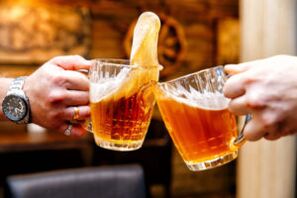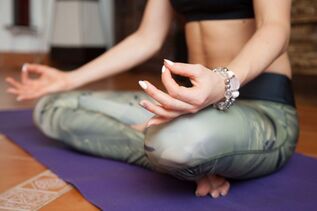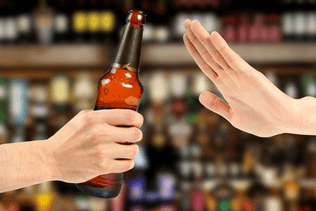
Beer is one of the most popular drinks in the world. Due to its low alcohol content, it is considered harmless and drunk without restrictions, which leads to the formation of a bad habit that imperceptibly turns into a disease - beer alcoholism.
Over time, most hop drinkers still recognize the problem, and then the question arises of how to get rid of beer addiction. To solve it, it is best to act in multiple directions at once.
Identifying the problem
Many believe that a low-alcohol drink is non-addictive and can lead to severe addiction, and they take the first step towards chronic beer alcoholism. A glass or two more than a few times a week will gradually turn into a liter or two or more to be consumed regularly. And now it's perfectly normal to drink beer every night.
But even in this situation, not everyone can admit the existence of a problem. To alleviate post-work fatigue, cheer up, make a movie more interesting - people have hundreds of excuses for denying the fact that beer addiction has long caught on and suppressed. Additionally, for the time being, most beer fans believe that they can easily stop drinking anytime they want without realizing that control of the situation has long been lost.
Therefore, the first step towards recovery should be the realization that the desire for the drink has become uncontrollable. By admitting to himself that the problem exists, the person is set to stop drinking beer as soon as possible each day.
How can you get rid of beer addiction?
For those contemplating how to wean a loved one or themselves from drinking beer every day, many methods have been developed. If the bad habit has not yet passed into the final stage of beer alcoholism, then you can try to deal with it yourself, otherwise you will need the help of specialists.
First you need to identify the reasons for the cravings for beer, and then try to eliminate them. You should not be afraid of a sober life, it is enough to remember how you lived before the frothy drink became a constant companion. After all, even then there were friends, interests, positive emotions, which means that all of this can be returned without alcohol.
And it is very important to prepare for work. The desire to stop drinking is not enough, it will take a lot of effort to get the result.
Psychological factors

It is very important to get rid of addiction on a psychological level. It is best to seek help from a qualified therapist, but there are some steps you can take on your own.
Getting rid of your beer cravings will be a lot easier when you think about how to relax and have fun. There are many options such as chatting with a pet, massage, yoga, dancing. A new hobby will fill the gap created by giving up beer festivals.
A change in your surroundings can help you forget about your addiction. It is worth getting rid of everything that reminds you of the old way of life. You can go further and do a relocation or renovation. If you've traditionally been drinking beer with your coworkers, consider changing jobs.
It is more difficult for women to stop drinking beer every day as they quickly develop a strong addiction due to psychological characteristics. And women don't need that much company and often drink alone, so that no one knows about their addiction for long. In order to wean off the habit of drinking beer, a woman needs to become more socially active and communicate with those who lead healthy lifestyles.
Reduction of beer consumption
Not everyone has enough inner strength to give up beer at some point immediately after deciding to give up a bad habit. In order for the rejection of the intoxicated drink not to be accompanied by constant stress, you need to act consistently.
If there is a certain tradition, for example drinking beer in the evening after work, you shouldn't give it up right away. To begin with, it is enough to gradually reduce the dose. “Drinking less” doesn't sound as scary as “stopping altogether”, so the brain won't resist such an attitude strongly, and the amount of drinking will steadily decrease.
Gradually the desire for beer weakens and then the drink can be given up entirely.
Treatment of physical addiction
It happens that a person with all his might cannot get rid of the habit of drinking beer himself. Either he keeps collapsing, or refusal to drink is accompanied by symptoms of real withdrawal - limb tremors, migraines, muscle pain, arrhythmias, high blood pressure.

In such cases you have to contact a specialist. After the examination and talking to the patient, the doctor will give advice on how to get rid of beer addiction. The following methods are used:
- Detox dropper.Special drugs that help eliminate toxins, as well as nutrients and vitamins, are added to the blood to improve well-being.
- coding.With the help of an ampoule sewn under the skin, sewn under the skin by intravenous or intramuscular injection, the patient is injected with a substance that slows the processing of ethanol. So if even a small amount of alcohol gets into the body, symptoms of severe poisoning appear immediately.
- antidepressants.The doctor prescribes sedatives so that refusing beer has negative consequences not only for the human body, but also for his psyche. They help reduce irritability and aggression, improve sleep, and prevent depression from developing.
The treatment of alcohol addiction can only be carried out with the consent of the patient, after the therapeutic scheme has been explained and he has been warned of the possible consequences.
Replacing beer with other products
There are many drinks that can replace beer:
- Kvass is a great alternative to beer because of the similarity of taste and texture.
- freshly squeezed juices;
- freshly brewed natural coffee, cocoa, hot chocolate;
- loose green tea;
- mineral water with lemon juice.
If you drink berry or vegetable smoothies instead of beer, not only can you get rid of the bad habit, but you can also improve your well-being and remove the beer belly too.
Another substitute for beer in the evening are dried fruits or nuts. The most important thing to remember is that these foods are high in calories. So you have to pay attention to the measure.
Find a new hobby
Many people drink beer just because they have a lot of free time and have nothing to do. The situation can easily be changed by finding something to do. Jogging or walking before bed, going to the gym, biking or skiing, roller blading or skating are great alternatives to beer.
There are also many interesting things for sofa potatoes, for example wood carving or collecting puzzles. And someone can remember a childhood hobby and pick up pencils or paints. In any case, if the hobby is what you want, it will very soon drive the thoughts of alcohol out of your head.
Treatment with folk remedies

Both modern and proven folk remedies will help you stop drinking beer yourself.
Most popular:
- Herbal cookings with the addition of lovage, European split hoof, bearberry, St. John's wort;
- tinctures on thyme, bitter wormwood, centauries (prevent the ingestion of alcohol and create the effect of coding);
- Teas with thyme, mint, calamus root, juniper berries.
It is believed that bee products like propolis and honey reduce alcohol cravings.
Get out of the beer at home
Most of the time, an irrepressible desire for a frothy drink leads to a person drinking every day, ie getting into a beer frenzy. Getting rid of beer addiction at home is possible if you act according to a plan:
- The most important thing is a person's desire to stop drinking. Without this, no action will help.
- It is necessary to gradually reduce the amount of beer - every next day to drink half as much as the previous one. In no case should you suddenly stop drinking alcohol, it is very harmful to your health. The body, used to constantly receiving alcohol that is suddenly withdrawn from the usual dose, can react with a sharp deterioration in well-being.
- The longer the breaks between drinks, the better. It is necessary to show perseverance and not drink the entire daily dose at once, but to divide it into parts and use it at intervals of 2-3 hours. During the day, you need to drink plenty of clean water, to which you can add lemon juice and a little honey. The liquid partially helps drown out the beer thirst, but most importantly, it cleanses the body and flushes out toxins and alcohol residue.
- It is advisable to change the environment at least for a short time.
- Gentle mode. It is very heavy on the body at this point, so you should not burden it with excessive physical and even mental activity. Light films, reading, short walks - you should limit yourself to a few days.
- body support. Given that the body has been exposed to the negative effects of alcohol for a long time, now it needs to recover. Vitamins and other beneficial substances can help with this. As soon as things get better, you need to add a variety of "healthy" foods to the menu - vegetables, fruits, herbs, nuts, etc.
- Sedatives help manage recurrent irritability and normalize sleep. It is good to brew tea with mint, valerian, or lemon balm.

These guidelines make the process of getting out of the binge and eliminating beer addiction a lot easier.
Prevention of beer alcoholism
Instead of thinking about how to get rid of beer addiction, it is better to know how to prevent it. This is very important if a person has been caught in an alcohol trap or if, for example, children in the family have reached puberty.
Reliable and detailed information about the harm beer alcoholism can cause to the body is the best preventive measure. In addition, it is necessary to understand that not only health will suffer, but also relationships with loved ones. Promoting a healthy lifestyle and setting the right priorities will also help prevent the problem.
It will be easier for a person who has once given up on beer to forget a bad habit if they avoid the previous businesses where they drank alcohol.
Conclusion
Quitting drinking beer isn't as easy as it seems. However, if you recognize the problem, make a decision and follow the planned plan, a positive result will not be long in coming. The main thing is to believe in yourself, not to withdraw and learn to look at things that are seemingly familiar differently.


























